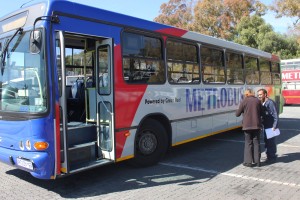Metrobus experimenting with green fuel to reduce carbon emissions
Posted by robykirk

One of the two Metrobuses which runs on dual fuel, a form of fuel that produces 90% less carbon emissions. Photo: Robyn Kirk
In a bid to save money and reduce carbon emissions, Johannesburg bus company, Metrobus has started the process of running their fleet of buses on environmentally-friendly dual fuel.
So far two Metrobus buses have been fitted with new engines that use dual fuel, a fuel that produces 90% less carbon emissions than regular diesel. Dual fuel is a mixture of natural gas and diesel. The ‘green’ buses are currently running routes in Johannesburg in order to test run the technology.
“The executive mayor [of Johannesburg, Parks Tau] is into the green concept, and wants us [Metrobus] to use alternative fuel,” said Esther Dreyer of Metrobus. “I think it’s an excellent idea.”
In addition to the two buses already on the road, a further 150 new buses using dual fuel technology will be purchased by Metrobus within the next year, the tender for which is currently being advertised.
A member of the Metrobus technical team that fitted the two buses, who asked not to be named because of company policy, explained that the drive for greener fleets was for environmental and financial reasons.
Environmental and economic sustainability
“In this city, carbon emissions are too high and need to be reduced,” the technician said. “The government needs to start the initiative, and they started with us.”
“Another concern is financial. The biggest cost in transport [businesses] is diesel and tires” he added. “A lease bus needs 500 litres of diesel per tank, and diesel is currently R14 per litre – that’s R7 000 every few days.”
This is the third time that Metrobus has experimented with employing cleaner fuel methods. The first bus they purchased, which only used natural gas, was fraught with technical problems. Their second attempt with a bus using ethanol gas came to halt as they struggled to access a reliable supplier of the fuel.
It is hoped that when all the new dual fuel vehicles are operational, they will eventually half the current fuel costs for Metrobus.
Originally published May 16, 2014 on the Wits Vuvuzela website
RELATED ARTICLES:
- Wits Vuvuzela. Petrol strikes never a worry, but a relief. August 4, 2011
- Wits Vuvuzela. The wheels on the bus(don’t) go round… April 1, 2014
About robykirk
Robyn was born and raised in Johannesburg, South Africa, still isn't dead and despises writing in the third person. She received her undergraduate degree at Rhodes University, having completed a Bachelor of Arts in Politics, History and Journalism at the end of 2013 and completed her Honours in Journalism (career entry) at Wits University in Johannesburg during 2014. From April 2015 until March 2016 she worked as the Communications Intern for the MRC/Wits Agincourt Research unit in rural Mpumalanga. This blog is a collection of the work produced: - for the Wits University student newspaper and website Wits Vuvuzela during 2014 - during her internship at MRC/WIts Agincourt Research Unit (2015/2016) and independent blogging (2014-present). Robyn is interested in everything besides sports and mean people. In the past she has specialised in photojournalism and television journalism, and considers visual media to be one of her strongest skills. She decided to become a journalist because learning about other people’s lives was more fun than putting on pants and having her own. Follow her on Twitter: @RobyKirkPosted on May 29, 2014, in Online stories, Wits Vuvuzela. Bookmark the permalink. Leave a comment.
Leave a comment
Comments 0